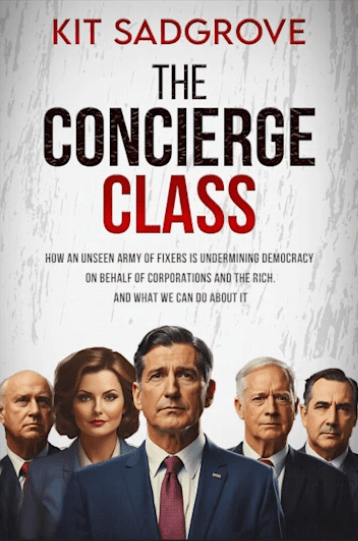Are you, or someone you know, captured by your employer?
Imagine you’re an academic, teaching in the area of, say, solvents.
As part of your work, you attend conferences to learn about scientific developments. During coffee breaks and over lunch, you chat to all kinds of people, including scientists and managers in industry. You listen to their concerns, and hear about the challenges they face.
You even get an invitation to visit a new state-of-the art solvents plant in Germany, where they’re making headway in developing new processes. It gives you important insights into the future.
And that gives you an idea for a scientific paper which might be accepted by a prestigious journal. So you sit down to write. But you need some background data, and so you call up your friend in Germany. She’s delighted to help.
And the good thing is, it’s all completely ethical. The company isn’t paying you. You’re a free agent.
Or are you? Is this the slippery slope of ‘capture’?
Capture and co-option are two related concepts that describe how corporations and wealthy individuals can influence the behaviour of regulators, trade bodies, politicians and scientists to serve their own interests, rather than the public good.
Capture is the process by which a regulatory body, trade association, politician or scientist becomes unduly influenced by a particular industry or special interest group, and begins to adopt their viewpoint. They may even start to act as their publicist, without necessarily realising what has happened. This can happen through a variety of means, such as lobbying, campaign contributions, and revolving doors between the public and private sectors.
Co-option is similar, but involves corporations and wealthy individuals seek to win over the same bodies and individuals by giving them a role in the design or implementation of a programme. It’s not a genuine form of participation, however, because the initiators don’t want the advice of the co-opted, merely their endorsement. They can do this by giving them a seat at meetings, funding research, providing speaking engagements, or offering consulting opportunities.
For example, a corporation may offer to discuss green issues, and engage with government, environmental bodies or the public, adopting a placatory tone, but without planning any major change. The invitees must therefore decide whether and how to engage with the organisation. Should they accept the invitation willingly and engage in open discussions? Should they attend meetings, but push for change? Should they reject the invitation outright, boycott it, or adopt some other strategy?
And critics even argue that the Concierge Class try to elevate educated members of historically oppressed communities (black, LGBTQ etc) into this more elite group, in the name of “diversity”. This represents ‘co-option’, where society’s elite becomes more demographically diverse, but the same old structures keeping the poor in their place remain unchanged.
Regulatory capture
If a regulatory agency is captured by the industry it’s supposed to regulate, it’s less likely to enforce regulations or may even weaken them altogether. This can lead to harm to the public, such as environmental pollution or unsafe products.
An explosion on the Deepwater Horizon oil rig killed 11 crew members and ignited a fireball visible from 40 miles away. It was later found that the regulator, the Minerals Management System (MMS), was dependent on the oil industry’s expertise, and thus reliant on industry’s judgement of suitable safeguards that should be incorporated into regulations. Essentially, said critics, the oil industry’s deep pockets gave it strong leverage over MMS decisions. And none of BP’s onshore engineers or top executives ever faced criminal charges.
Trade association capture
If a trade body is captured by its members, it may lobby for policies that benefit those members, even if those policies are harmful to the public. The National Farmers’ Union (NFU) has been criticized for its close ties to the government and for its lobbying on behalf of large-scale intensive farming practices. This has led to accusations that the NFU’s interests are not aligned with those of small-scale farmers or consumers.
And critics have accused the British Property Federation (BPF) of lobbying for policies that benefit property developers, at the expense of tenants and local communities. The BPF has opposed measures to increase affordable housing provision and has lobbied against taxes on property speculation and other policies that would benefit the public but harm the profits of its members.
Political capture
The UK’s conservative party is heavily reliant on housing developers, major landowners, and those with large property portfolios, according to a report by Transparency International UK. The party received over 80% of its political donations from individuals and companies related to substantial property interests between 2010 and 2020((https://www.transparency.org.uk/house-of-cards-UK-housing-policy-influence-Conservative-party-donations-lobbying-press-release)). No other political party had such as high ratio of reportable donations from this industry.
And the US political system is widely seen as being captured by money. In the 2020 election cycle, corporations and wealthy individuals spent over $14 billion on campaign contributions and lobbying. This gives them a significant amount of influence over politicians, who are heavily reliant on their financial support to promote their policies to voters.
Scientific co-option
Capture and co-option has a negative impact on scientific research. If corporations are able to co-opt scientists, they may be able to manipulate the design of the research, or amend the findings to support their own interests.
Breakfast cereal companies have been accused of funding research that exaggerates the health benefits of their products. For example, a study funded by Kellogg’s found that eating breakfast cereal was associated with better academic performance. But the study was criticised for its failure to control for other factors that could have influenced academic performance, such as socioeconomic status.
What’s to be done?
Members of the Concierge Class need to be aware of the risks of capture, and stand firm against unethical behaviour on the part of their employer.
